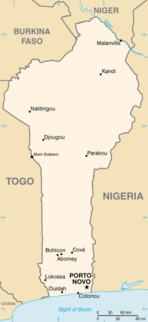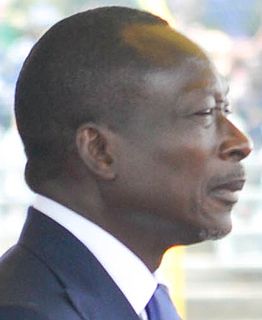The Republic of Benin was formed in 1960 when the colony of French Dahomey gained independence from France. Prior to this, the area that is now the Republic of Benin was divided largely between two coastal kingdoms, Dahomey and Porto-Novo, and a large area of various tribes in the north. The French assembled these various groups together into the colony of French Dahomey, which was part of the various colonies of French West Africa from 1904 until 1960. In the independence era, the republic was extremely unstable for the first decade and a half of existence, with multiple governments and multiple military coups. In 1972, Mathieu Kérékou led a military coup deposing the Presidential Council and appointing himself as the head of state, a position he held until 1991 when the country returned to multiparty elections. Since that point, the state has held multiple presidential and legislative elections and a number of different parties have become important.

The Politics of Benin take place in the framework of a presidential representative democratic republic, wherein the President of Benin is both head of state and head of government, and of a multi-party system. Executive power is exercised by the government. Legislative power is vested in both the government and the legislature. The Judiciary is independent of the executive and the legislature. The current political system is derived from the 1990 Constitution of Benin and the subsequent transition to democracy in 1991. The Economist Intelligence Unit has rated Benin as "hybrid regime" in 2016.

The Action Front for Renewal and Development is a political party in Benin.

Elections in Benin take place within the framework of a multi-party democracy and a presidential system. Both the President and the National Assembly are directly elected by voters, with elections organised by the Autonomous National Electoral Commission (CENA).
Bruno Ange-Marie Amoussou is a Beninese politician who was President of the National Assembly of Benin from 1995 to 1999 and Minister of State for Planning and Prospective Development under President Mathieu Kérékou from 1999 to 2005. He is currently a Deputy in the National Assembly. As the long-time leader of the Social Democratic Party (PSD), Amoussou stood as a presidential candidate in 1991, 1996, 2001, and 2006.
The African Movement for Development and Progress is a political party in Benin. In the legislative elections held on 30 March 2003, the party was part of the Presidential Movement, the alliance of supporters of President Mathieu Kérékou, who had won the 2001 presidential election, and won nine out of 83 seats. The President of MADEP is Séfou Fagbohoun, a wealthy businessman.
The Benin Rebirth Party is an oppositional, more or less liberal party in Benin. The party is led by Nicéphore Soglo, who was President of Benin from 1991 to 1996 and later Mayor of Cotonou.
The Social Democratic Party is a political party in Benin.
Adrien Houngbédji is a Beninese politician and the leader of the Democratic Renewal Party, one of Benin's main political parties. He was President of the National Assembly of Benin from 1991 to 1995, Prime Minister of Benin from 1996 to 1998, and President of the National Assembly again from 1999 to 2003. Beginning in 1991, he stood repeatedly as a presidential candidate; he placed second in 2006, but was heavily defeated by Yayi Boni in a second round of voting. Since 2015, he has served for a third time as President of the National Assembly.

Thomas Boni Yayi is a Beninese banker and politician who was President of Benin from 2006 to 2016. He took office after winning the March 2006 presidential election and was re-elected to a second term in March 2011. He also served as the Chairperson of the African Union from 29 January 2012 to 27 January 2013.

Presidential elections were held in Benin on 5 March 2006. Long-time president Mathieu Kérékou was barred from running again by a two-term limit and an age limit of 70 years for candidates; in July 2005 he signalled that he would not seek to change the constitution, as has been done in some other African countries, so that he could run again. Kérékou's long-time rival Nicéphore Soglo was also barred from standing due to his age. With both of the men who had been the country's leading political figures for many years unable to contest the election, it had a level of openness and unpredictability that is uncommon to African presidential elections. Since no candidate won a majority, a second round was held between the two leading candidates on 19 March; Yayi Boni won the election and took office in April.

Presidential elections were held in Benin on 4 March 2001, with a second round run-off on 18 March. They controversially resulted in the re-election of Mathieu Kérékou for a second term. Kérékou's rival Nicéphore Soglo, who had been president from 1991 to 1996, failed in his bid to reclaim the presidency; although he qualified to participate in the second round of the election against Kérékou, he refused to do so, alleging electoral fraud. Adrien Houngbédji, the parliament speaker and third-placed candidate, also refused to participate in a second round. As a result, Kérékou faced fourth-place candidate Bruno Amoussou, who was planning minister and had already given his support to Kérékou, in the second round; Kérékou won an easy victory with 84% of the vote.

The People's Republic of Benin was a socialist state located in the Gulf of Guinea on the African continent, which would become present-day Benin. The People's Republic was established on 30 November 1975, after the 1972 coup d'état in the Republic of Dahomey. It effectively lasted until 1 March 1990, with the adoption of a new constitution, and the abolition of Marxism-Leninism in the nation in 1989.

Presidential elections were held in Benin in March 1991, the first direct presidential elections since 1970. Elections under the military regime of Mathieu Kérékou had been indirect, with the president chosen by the National Assembly.

The Presidential Council was a triumvirate system of government in the Republic of Dahomey from 7 May 1970 until 26 October 1972. The Presidential Council included Hubert Maga, Justin Ahomadégbé-Tomêtin, and Sourou-Migan Apithy as equal members of a council which held all legislative and executive power in the state of Dahomey.

The Union for the Triumph of Democratic Renewal was a political alliance in Benin.

Presidential elections were held in Benin on 6 March 2016, having been delayed by one week due to logistical constraints. Incumbent President Thomas Boni Yayi was at the end of his second presidential term and was constitutionally barred from running for a third. The elections grabbed the interest of many of the country's top businessmen, resulting in over 30 candidates running for the presidency. A second round was held on 20 March, in which businessman Patrice Talon defeated Prime Minister Lionel Zinsou.








